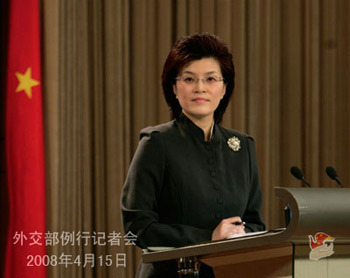Am I the only one getting tired of headlines that begin, China Warns....?
2010 is already thick with them. China kicked off the year by warning Switzerland against accepting Uighur Guantanamo detainees and then warned Hong Kong over a proposed referendum on democracy. China also warned the US that Secretary of State Hillary Clinton's call for Beijing to investigate Google cyber-attack claims could damage bilateral relations. Before the month was out China had issued yet another warning -- of sanctions on United States weapons companies over arms sales to Taiwan (even though the US has banned its companies from selling arms to China since the 1989 Tiananmen massacre).
In February, Chinese officials warned that a meeting between President Obama and the Dalai Lama would "threaten trust and co-operation" between the US and China.
In March, China's Minister of Industry and Information Technology warned Google that if it stops censoring search results in the country it will "have to bear the consequences." The same month, the Minister of Commerce warned the United States against imposing trade sanctions over Beijing's currency controls.
In April, Beijing was busy warning Japan about the arrest of a Chinese boat captain after his boat collided with two Japanese patrol vessels near the disputed Diaoyu/Senkaku Islands in the East China Sea.
In May, China was more reassuring; buoying European markets by insisting that it doesn't intend to sell Europe's debt. But by June China was back in finger-wagging form, with a senior Chinese government official warning the G20 delegates against bringing up the issue of Beijing's manipulation of the yuan, with the remark that such discussion would be "self-defeating".
In July, China warned the United States to not get involved in the dispute between China and its neighbors over islands in the South China Sea, while China's People Liberation Army warned the US about its plans to send an aircraft carrier for naval exercises near China's coast. This August, China warned Vietnam and South Korea against holding military exercises with the United States, and in September put pressure on the Philippines over the planned restoration of its outpost on the Spratly Islands.
 China's Foreign Ministry Spokeswoman, Jiang Yu complains the media makes too much of the Chinese "pressure issue"
China's Foreign Ministry Spokeswoman, Jiang Yu complains the media makes too much of the Chinese "pressure issue"
Beijing has become a master of the veiled threat -- using words that suggest ominous consequences but which are rarely backed up with specifics. There is often talk of "harming ties" or "hurting relations" with the country in question. In the case of last month's US Congress' bill to impose tariffs on Chinese imports in response to Beijing's continued undervaluation of the yuan, China has notched up its language to include "serious damage" to bilateral trade relations.
China's latest warning is to the Director of the Norwegian Nobel Institute Geir Lundestad. Lundestad reported this week that China's Deputy Foreign Minister Fu Ying had advised him against awarding the Nobel Peace Prize to Chinese intellectual and human rights activist, Liu Xiaobo. Mr. Fu said that such a move would, "pull the wrong strings" in relations between Norway and China, and be regarded as "an unfriendly act." Liu, a veteran of Tiananmen Square, was the co-author of the now-famous Charter 08, a political manifesto that calls for stronger civil rights and democratic reform. He was sentenced last December to 11 years in jail for "inciting subversion of state power."
In his support for Liu Xiaobo's nomination for the Nobel Peace Prize, former Czech leader Vaclav Havel wrote that Mr. Liu's ideals, which include "respect for human rights and human dignity, and the responsibility of citizens to ensure that their governments respect those rights, represent humanity's highest aspirations." In stark contrast, Chinese Foreign Ministry spokeswoman Jiang Yu stated at a Beijing news briefing that Mr. Liu's actions were "diametrically opposed to the aims of the Nobel prize," and that he was jailed because he "violated Chinese law."
Jiang Yu, known for her signature Death Star Commander-style outfits, complained to the international media about its coverage of Beijing's warnings to the Nobel Committee. "Every year, you report that China will apply pressure...You often talk about the Chinese pressure issue," she said, as if this were something bewildering to her.
Perhaps we should all try to be more like Ms. Jiang and not take the Chinese "pressure issue" so seriously. In fact, maybe it's time for some of us to find out where the pressure ends and the action begins.
